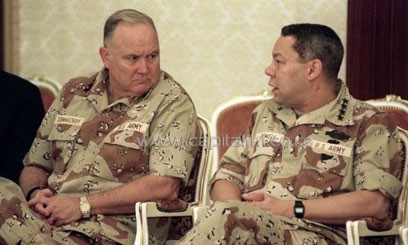Quickly promoted up through the ranks, his reputation for bravery was confirmed during his second tour of Vietnam in 1970 when he rescued men from his battalion who were trapped in a minefield in the Batangan Peninsula.
After rushing to the scene in a helicopter, he crawled across the minefield, held a severely wounded man down until a splint could be put on his leg, and then led survivors to safety by ordering mines to be marked with shaving cream.
Unlike some of the generals that succeeded him in America’s more recent wars, Schwarzkopf was a combat veteran, earning three silver stars and the coveted Combat Infantryman Badge for those who personally fought in battle.
His brusque and bold style was also the stuff of legend.
“When you get on that plane to go home, if the last thing you think about me is ‘I hate that son of a bitch’, then that is fine because you’re going home alive,” so one quote goes.
Schwarzkopf’s infamous temper spawned the nickname “Stormin’ Norman,” which became tabloid headline fodder during the 1991 Gulf War.
In 1983 he led troops in battle during the US invasion of Grenada and in 1988 he was appointed commander-in-chief of the US Central Command, responsible for operations in the Horn of Africa, the Middle East and South Asia.
As commander, Schwarzkopf had concocted a plan for the defence of the oil fields of the Persian Gulf against a possible invasion by Iraq.
After the US had engaged in a six-week air assault of Iraqi forces in January 1991, this became part of the strategy credited with bringing the ground war to a close in just four days.
He was also a public face of the campaign, appearing regularly in faded fatigues and a field soldier’s patrol cap to brief the world’s media.
“In the aftermath of that war, General Schwarzkopf was justly recognized as a brilliant strategist and inspiring leader,” Panetta said.
“Today, we recall that enduring legacy and remember him as one of the great military giants of the 20th century.”
After the war, Schwarzkopf turned down the position of army chief of staff and retired from active service in August 1991.
He had been successfully treated for prostate cancer in 1993.










































